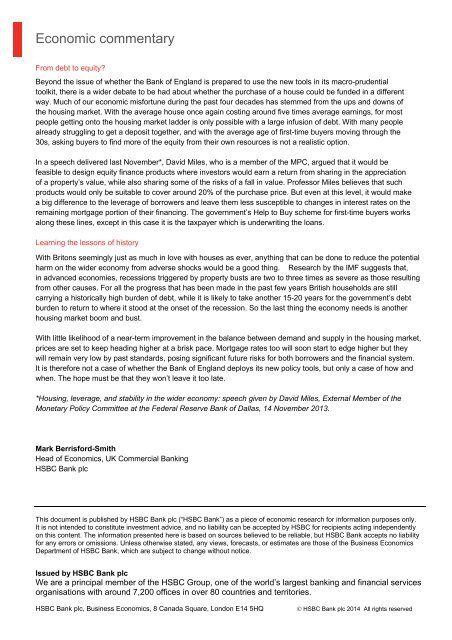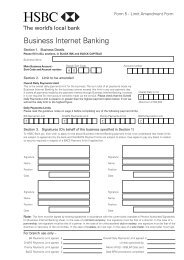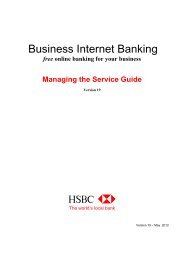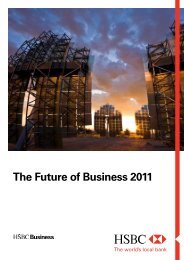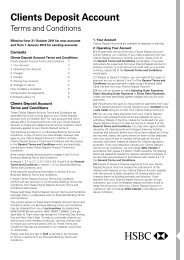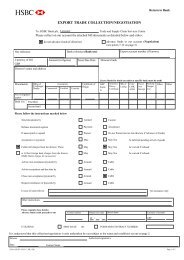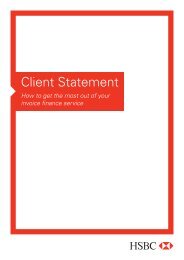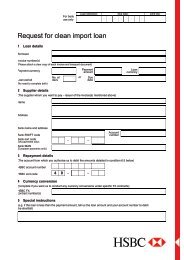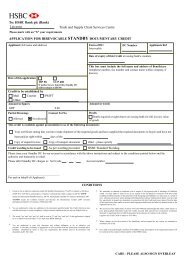Economic commentary - Business banking - HSBC
Economic commentary - Business banking - HSBC
Economic commentary - Business banking - HSBC
You also want an ePaper? Increase the reach of your titles
YUMPU automatically turns print PDFs into web optimized ePapers that Google loves.
<strong>Economic</strong> <strong>commentary</strong>From debt to equity?Beyond the issue of whether the Bank of England is prepared to use the new tools in its macro-prudentialtoolkit, there is a wider debate to be had about whether the purchase of a house could be funded in a differentway. Much of our economic misfortune during the past four decades has stemmed from the ups and downs ofthe housing market. With the average house once again costing around five times average earnings, for mostpeople getting onto the housing market ladder is only possible with a large infusion of debt. With many peoplealready struggling to get a deposit together, and with the average age of first-time buyers moving through the30s, asking buyers to find more of the equity from their own resources is not a realistic option.In a speech delivered last November*, David Miles, who is a member of the MPC, argued that it would befeasible to design equity finance products where investors would earn a return from sharing in the appreciationof a property’s value, while also sharing some of the risks of a fall in value. Professor Miles believes that suchproducts would only be suitable to cover around 20% of the purchase price. But even at this level, it would makea big difference to the leverage of borrowers and leave them less susceptible to changes in interest rates on theremaining mortgage portion of their financing. The government’s Help to Buy scheme for first-time buyers worksalong these lines, except in this case it is the taxpayer which is underwriting the loans.Learning the lessons of historyWith Britons seemingly just as much in love with houses as ever, anything that can be done to reduce the potentialharm on the wider economy from adverse shocks would be a good thing. Research by the IMF suggests that,in advanced economies, recessions triggered by property busts are two to three times as severe as those resultingfrom other causes. For all the progress that has been made in the past few years British households are stillcarrying a historically high burden of debt, while it is likely to take another 15-20 years for the government’s debtburden to return to where it stood at the onset of the recession. So the last thing the economy needs is anotherhousing market boom and bust.With little likelihood of a near-term improvement in the balance between demand and supply in the housing market,prices are set to keep heading higher at a brisk pace. Mortgage rates too will soon start to edge higher but theywill remain very low by past standards, posing significant future risks for both borrowers and the financial system.It is therefore not a case of whether the Bank of England deploys its new policy tools, but only a case of how andwhen. The hope must be that they won’t leave it too late.*Housing, leverage, and stability in the wider economy: speech given by David Miles, External Member of theMonetary Policy Committee at the Federal Reserve Bank of Dallas, 14 November 2013.Mark Berrisford-SmithHead of <strong>Economic</strong>s, UK Commercial Banking<strong>HSBC</strong> Bank plcThis document is published by <strong>HSBC</strong> Bank plc (“<strong>HSBC</strong> Bank”) as a piece of economic research for information purposes only.It is not intended to constitute investment advice, and no liability can be accepted by <strong>HSBC</strong> for recipients acting independentlyon this content. The information presented here is based on sources believed to be reliable, but <strong>HSBC</strong> Bank accepts no liabilityfor any errors or omissions. Unless otherwise stated, any views, forecasts, or estimates are those of the <strong>Business</strong> <strong>Economic</strong>sDepartment of <strong>HSBC</strong> Bank, which are subject to change without notice.Issued by <strong>HSBC</strong> Bank plcWe are a principal member of the <strong>HSBC</strong> Group, one of the world’s largest <strong>banking</strong> and financial servicesorganisations with around 7,200 offices in over 80 countries and territories.<strong>HSBC</strong> Bank plc, <strong>Business</strong> <strong>Economic</strong>s, 8 Canada Square, London E14 5HQ <strong>HSBC</strong> Bank plc 2014 All rights reserved


